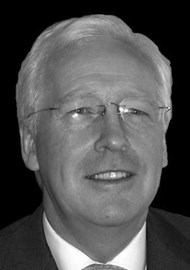
Recently I was approached by the son of a 75-year-old lady for a second opinion on a large fungating malignant melanoma on the outer lateral aspect of her left thigh. She had noticed an enlarging 50p size pigmented lesion just at the start of lockdown in March 2020 but found it impossible to see her GP initially and thereafter because of the rules, regulations and restrictions imposed at her GP practice.
The son described this as an immensely frustrating situation that has now, two years on, left the poor lady with a massive soft tissue necrotic, smelly and leaking tumour that is severely impacting on her mental status and is incapacitating because, not only does she have pain, but she also cannot put clothes on. She has been telephone referred to the local hospital but without a face-to-face appointment, then on to a plastic surgeon and multidisciplinary team (MDT) to decide on management, but unfortunately, whatever decision they have made, has been poorly relayed to the family and, most importantly, the patient who needs to be properly informed.
The GP cannot be easily reached through the receptionist and has not managed to see the patient at all during the past two years, her consultations with oncologists are cut short without any discussion, and there appears to be a frustrating lack of joined up thinking to get the support this patient needs, especially with regard to terminal care. Dressings are being purchased at great expense by the son. The district nurse cannot attend for long and now the dressing changes, which take over two hours, are being done by a friendly but untrained neighbour. She is on oral morphine in only homeopathic doses and there is no sign of referral for a terminal care pathway. The MDT clinicians do not have time to discuss a care pathway of support with either the patient or her relatives, or to discuss a request from the patient to even consider a reduction of tumour size, which the patient is desperate for, even if she has to cut out the tumour herself!
Yesterday, the son phoned me, a 20-year resigned from the NHS surgeon, to discuss if I would be willing to operate on the tumour. My immediate thoughts after seeing the site and size of this massive tumour on a clear photograph was that it is operable, but also that I have seen this before in the 1980s as a senior registrar. After excision of that tumour it still returned rapidly but the surgery granted a useful space of time for the brilliance of oncologist and melanoma specialist, Professor Spyros Retzas, to put the secondary tumour growth into remission and, as far as I am aware, that strange melanoma, confined to one leg, did not return for at least the 10 years that I remained in the NHS. The basic philosophy then was don’t take out the groin lymph nodes – use them as monitors of treatment effectiveness. Now we are dictated by policy and pathways of care, and I really have no choice but to sympathise and apologise for the described apparent neglectful care that this lady has seen to date and say that I am restricted in my working practice to deal with her even though my experience and skill would, in my opinion, help alleviate her misery. The Care Quality Commission (CQC) and General Medical Council (GMC) would have a field day if I took her on without involving the local MDT.

We clinicians are dictated to by influencers who often may have a different opinion on management, even though we will have as much, if not more, experience. This is true particularly in this instance, but because the influencers hide behind a wall of protection it is now impossible for me to act as an individual. The Patterson and Shipman enquiries and reports put the ‘scarries’ up them and now influencers say we need GMC appraisals, revalidation, mandatory training by unknown influencers and, most recently, biennial reviews by the facility into our working practices. What nonsense – no crimes or misdemeanours have been seen to have been prevented by contributing these expensive mandatory requirements and, indeed, much valued clinical time is wasted getting data together for a formal interview that costs up to £800 (a gravy train for some!). We all know that this stifles innovation and fosters an acceptance of mediocrity and lack of improvement in care. This is a fault with the NHS and influencers don’t seem to get it. All of this is a prime example of how medical care has changed. We, as a collective group of clinicians, have been railroaded into what we are told is best practice by a largely unknown group of influencers. This case epitomises how things have changed for the worse not the better in the NHS and this isn’t simply down to money. Am I alone in thinking that the caring generation of dedicated doctors of the Boomer years (1946-1964) have gone and we are now relying on Generation X (1965-1980) and the Millennials (1981-1996) who have had a comparatively easy and privileged upbringing in a major economy country? Is this generation materialistic ‘easy lifers’ looking for a laid-back, computer-generated life with all of the financial perks, but with as little stress as possible and an early retirement? Doctors who prefer to not do on-call and balance their workload to maximise domestic interests or to maximise their available time to do private practice but still enjoy the perks of being a very well-paid NHS consultant?
Am I alone in seeing a large rise in hybrid private / NHS operating lists in established private hospitals, run by full-time NHS private surgeons who have manipulated their timetables to free them for two days in the working week to operate in the private sector, often on their own NHS patients for a nice extra income – all at the expense of us, the taxpaying public? Surely this is a scandal that should stop, and it is time to build more hospitals, pay surgeons appropriately for their work and expertise, and pay enough to prevent their need to work elsewhere. It cannot be right that a full-time NHS surgeon is OK to work only one NHS list a week yet twice as many in the private sector and still enjoy weekends off. The truth is that the private sector is employing our NHS surgeons to moonlight in the private sector during the working week to fulfil lucrative NHS contracts.
So how have we got into a 2022 waiting list mess that is hugely costly to the taxpayer yet gives the private hospitals a steady and higher income than they were experiencing pre-COVID? In March 2020 the full-time non-NHS surgeons were asked, and they agreed, to stop doing elective surgery so that NHS consultants and their junior staff could use the facility to keep working on urgent cases in clean hospitals. This was not the best allocation of resources and hospitals published excellent profit figures. Although many NHS clinicians had a good lockdown with very little to do, the shopfront staff worked tremendously hard to keep us safe and they deserve all credit. But no hospital was overfilled with patients, large spaces remained unused and no temporary theatre spaces were constructed. Now those same surgeons do hybrid lists throwing their own private patients ahead of NHS patients at the expense of the working practices of the displaced full-time private surgeons.
The simple cause of the problem was created over previous decades starting with a Labour government, where closure of many good, small and efficient hospitals caused a large reduction of available bed numbers and discarded, for short-term financial gain, the possibility of conversion of those facilities to isolation hospitals for COVID care.
The simple solution now is to rebuild more hospitals, rebuild our excellent medical schools, and provide proper nurse and paramedic training facilities, and to recruit and retain a happy and satisfied, respected workforce that has pride, ambition and honesty in their working practices. It is immensely important that all of the ancillary staff must share in success – without them there is no NHS and a happy ancillary staff will be more efficient and caring, especially in areas to reduce risk of nosocomial infection and pressure sores. We must also return to consultant and matron-led teams where care standards are far better assessed locally through inclusion in proper national audits and comparative published standards, than through the terrors and doom-mongering of influencing political administrators and an oft overly critical and scaring CQC Quango.
COMMENTS ARE WELCOME






